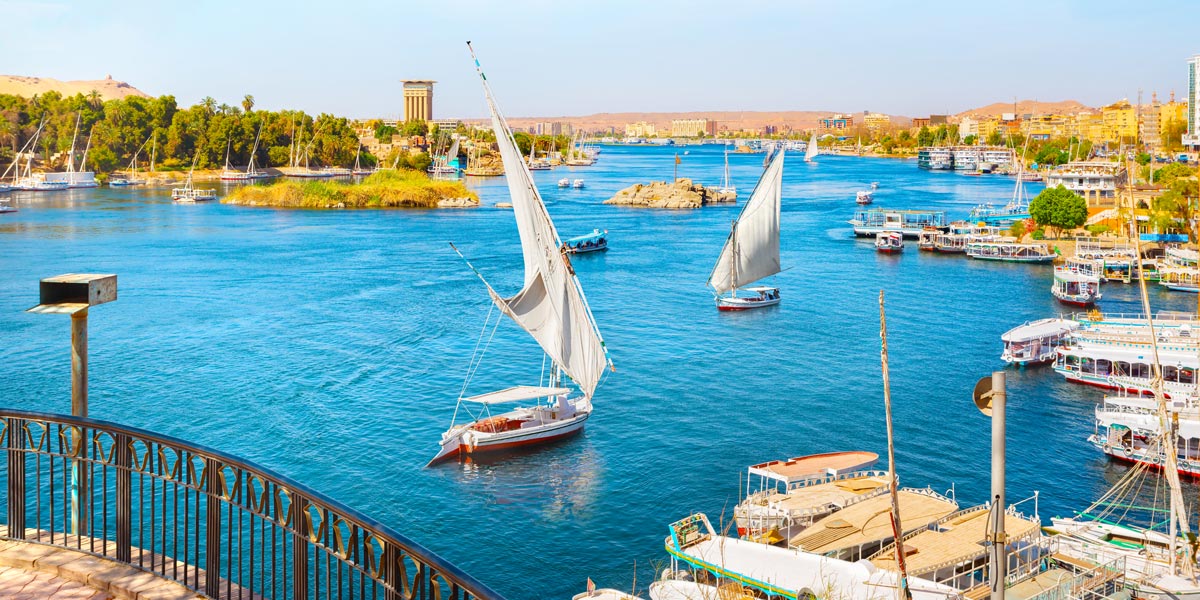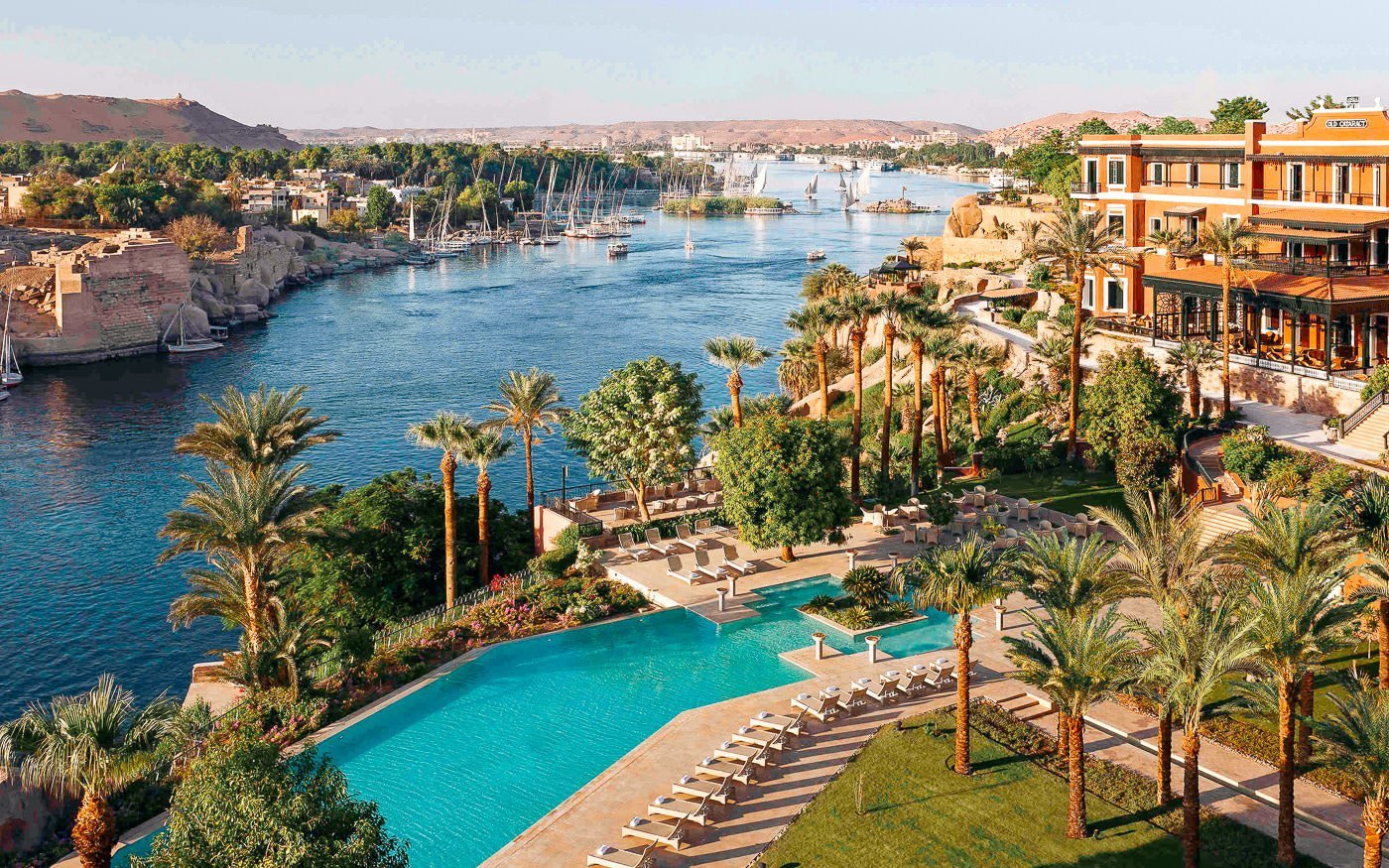



Aswan, located in southern Egypt along the Nile River, is a city known for its stunning natural beauty, historical significance, and vibrant culture. Aswan is one of the most serene destinations in Egypt, offering a peaceful contrast to the hustle and bustle of Cairo. It is also a gateway to some of Egypt's most important monuments, including the Abu Simbel temples and Philae Temple.
October – April: The best time to visit Aswan is during the cooler months of fall, winter, and early spring, when temperatures are much more comfortable for sightseeing. The weather is warm but pleasant, making it ideal for outdoor activities and exploring the temples.
May – September: Summer months in Aswan can be extremely hot, with temperatures often exceeding 40°C (104°F), so it’s best to avoid visiting during this time unless you are accustomed to extreme heat.
By Air (Aswan International Airport):
Aswan has its own international airport (ASW), about 15 km from the city center. You can catch flights from major Egyptian cities, such as Cairo, or from international destinations.
By Train:
The train system in Egypt is an easy and affordable way to travel to Aswan. The journey from Cairo to Aswan takes approximately 13 hours, and it offers beautiful views along the Nile River.
By Bus:
Long-distance buses connect Aswan to Cairo and other major cities. The bus ride can take 12-14 hours depending on traffic and road conditions.
By Car:
You can also rent a car or hire a driver to drive from Cairo to Aswan, which typically takes about 12 hours.
Abu Simbel Temples:
The Abu Simbel temples, one of Egypt’s most iconic landmarks, were carved into the mountainside during the reign of Ramses II. These temples, including the grand Temple of Ramses II and the Temple of Nefertari, were relocated to their current position to avoid being submerged by the construction of the Aswan High Dam.
Philae Temple:
The Temple of Philae, dedicated to the goddess Isis, is located on an island in the Nile River and is one of Aswan’s most visited sites. It is famous for its intricate carvings and stunning location.
Aswan High Dam:
The Aswan High Dam, completed in 1970, is one of the largest dams in the world and a remarkable feat of modern engineering. The dam regulates the Nile River’s flow and is essential for Egypt’s irrigation and electricity supply. You can visit the dam and the Nubian Museum nearby to learn about its construction.
Nubian Museum:
The Nubian Museum in Aswan offers insights into the history and culture of the Nubian people and the history of the Nubian civilization, which once thrived in this region.
Unfinished Obelisk:
The Unfinished Obelisk is located in the granite quarries of Aswan and is one of the largest known ancient obelisks. It was abandoned due to a crack found in the stone during its carving, offering a glimpse into ancient Egyptian stoneworking techniques.
Elephantine Island:
Elephantine Island, located in the Nile River just north of Aswan, is home to ancient ruins, including the Temple of Khnum and the Nilometer. It also offers great views of the river and surrounding landscapes.
Kitchener's Island:
A botanical garden on Kitchener's Island, this lush, green island is filled with exotic plants and trees, making it a peaceful escape from the desert heat. It is accessible by boat and is perfect for a relaxing stroll.
Tomb of the Nobles:
The Tomb of the Nobles is a complex of tombs belonging to the ancient Egyptian nobility. These tombs are decorated with colorful murals and offer insight into the lives of the elite in ancient Egypt.
Kom Ombo Temple:
About 50 km north of Aswan, Kom Ombo Temple is a double temple dedicated to the gods Sobek and Horus. The temple is famous for its symmetry and the ancient medical instruments displayed in the on-site museum.
Edfu Temple:
The Temple of Horus at Edfu, located about 105 km from Aswan, is one of Egypt’s best-preserved temples. It features impressive pylons and detailed reliefs that provide insight into Egyptian mythology and religion.
Nile River Cruise:
A Nile River cruise from Aswan is a must-do experience, offering a peaceful way to explore the landscape and ancient temples along the river. You can opt for a short cruise or a longer journey to destinations like Luxor.
Feluca Ride on the Nile:
Take a traditional felucca boat ride on the Nile River to enjoy the serene waters, beautiful views of the islands, and the ancient monuments that line the riverbanks.
Visit a Nubian Village:
Take a boat ride to a Nubian village near Aswan to experience the traditional culture of the Nubian people. Learn about their customs, try local food, and see the colorful houses along the river.
Camel Ride to St. Simeon Monastery:
Explore the St. Simeon Monastery, located across the Nile from Aswan, by taking a camel ride. The ancient Christian monastery is situated in the desert and offers stunning views of the surrounding area.
Luxury:
Sofitel Legend Old Cataract Aswan: A luxurious hotel with stunning views of the Nile River and classic colonial-style rooms, located near many of Aswan’s key attractions.
Mövenpick Resort Aswan: A 5-star resort on an island in the Nile, offering exceptional service, beautiful gardens, and a spa.
Mid-Range:
Pyramisa Isis Island Resort & Spa: Offering a tranquil environment, the resort features beautiful views of the Nile and has a variety of restaurants and recreational facilities.
Basma Hotel Aswan: A comfortable and affordable option with great views of the Nile and close to many of Aswan’s historical sites.
Budget-Friendly:
Aswan Moon Hotel: A budget-friendly option located in the heart of the city, providing basic amenities and a good location near the Nile.
Nile Hotel Aswan: An affordable hotel with a central location, offering simple accommodations and access to many of the city’s attractions.
✅ Local Specialties:
Foul Medames: A traditional Egyptian dish made from fava beans, often eaten for breakfast with olive oil, garlic, and lemon.
Koshari: A comforting dish made from rice, pasta, lentils, and crispy onions, often served with a tomato-based sauce.
Grilled Fish: Aswan’s proximity to the Nile makes it an ideal place to enjoy freshly grilled fish, often served with rice and vegetables.
🍴 Top Restaurants:
The Nubian Restaurant: Located on the banks of the Nile, this restaurant serves traditional Nubian dishes with a view of the river.
Aswan Moon Restaurant: A stylish restaurant offering both Egyptian and international dishes, known for its beautiful views of the Nile.
El Masry Restaurant: A popular spot among locals, serving delicious Egyptian dishes, including kebabs and meat stews.
Nubian Culture:
Aswan is the heart of Nubian culture, and you can explore it through the Nubian villages and the Nubian Museum. Nubians have their own distinct language, dress, and customs, and visitors often learn about their traditional crafts, music, and way of life.
Islamic Traditions:
Aswan is also home to Islamic traditions, and you can visit the local mosques and markets to get a sense of the city’s vibrant Islamic culture.
Traditional Crafts:
Aswan is known for its handmade crafts, including woven textiles, pottery, and jewelry. Visitors can purchase these items at the local markets or souks.
✔️ Dress Modestly: While Aswan is a popular tourist destination, it’s important to respect local customs by dressing modestly, especially when visiting religious sites. ✔️ Stay Hydrated: The heat can be intense, so be sure to drink plenty of water, wear sunscreen, and carry a hat or scarf to protect yourself from the sun. ✔️ Hire a Guide: Consider hiring a local guide for a deeper understanding of the history and culture of the ancient sites you visit. They can also help you navigate the remote areas around Aswan. ✔️ Take Boat Rides: Boat rides along the Nile River are a fantastic way to see the city and surrounding temples from a different perspective.